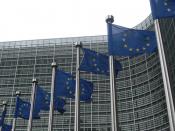Will the EU change its antitrust and state aid policy after the Twin Towers attack? by Antonio Fogna Following the September 11th, 2001, terrorist attacks on New York's World Trade Centre and the Pentagon, many people may find inappropriate to think in terms of financial and legal consequences. They may well have a point, and certainly in times of horror and grieve, economic and legal issues are not the centre focus of our lives.
Sadly the economic costs of the Twin Towers' and of the Pentagon's air assault, may be a crucial issue in the next month. As a matter of fact many companies already have to deal with the consequences of the September 11th, tragedy. The first industry hit by the attack is, of course, the airlines industry, not only the traffic to the U.S. was stopped for four day with an estimate lost of $35 million a day, but, frightened by the risk of more hijackings and suicide attacks, fewer people are flying, depriving an already marginally profitable industry of revenues just when it faces the need for more expensive security.
Furthermore, insurers are equally frightened, some of them already suffered lost in connection with the Twin Towers collapse, and may withdraw from war-risk insurance that the air carriers are required to have. Insurers also called for new insurance terms.
If the picture is not bad enough, it must be said that European air carries were having financial problems before September 11th. For example Sabena, the former Belgian flag carrier, now owned by Swiss Air, was saved from bankruptcy just one month ago after long discussions between the Belgian Government and Swiss Air, Alitalia, the Italian airline company, is still subject to a reconstruction and a reorganisation process, and in August the EU Commission granted it approval...


